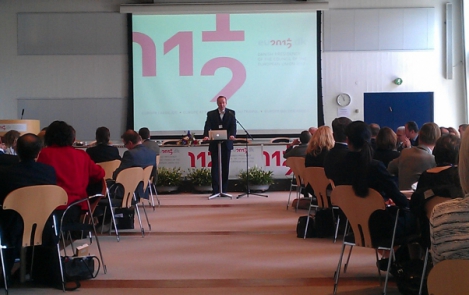-
Reset
+


"Introduction to the report of the EU Task Force on e-Health: Redesigning health in Europe for 2020", Europe's Information Society
08.05.2012
Toomas Hendrik Ilves
President, Estonia
Chariman of the Task Force
Demography is one of the few areas of social science where we can predict the future. We know how many old and retired people Europe will have in 8, 28 or 48 years, as well as how many people of working age we will have to support them. In this regard, the future in Europe, barring any extreme developments, does not look good.
Europe is ageing, the proportion of the elderly in our countries is increasing, due both to fewer children as well as increased life spans. How can we ensure that European healthcare in the future will be affordable, will not burden our economies and at the same time keep up with the latest advances in medicine? Moreover, in a Europe of increasing mobility, how do ensure that patients can be assured the highest quality of healthcare everywhere in the Union?
We know that in healthcare we lag at least 10 years behind virtually every other area in the implementation of IT solutions. We know from a wide range of other services that information technology applications can radically revolutionise and improve the way we do things. We know as well, from innovative approaches already used around the EU, that many solutions to the impending crisis in healthcare already exist. In other words, by implementing IT solutions to preventative and ongoing healthcare we can make life better for patients, indeed for all who require our healthcare services.
The following report outlines the Task Force's conclusions regarding the key issues faced by a fundamental re-organisation of healthcare to make use of already existing information technologies. These solutions are often not medical at all, but rather deal with how in the future we will need to treat data, privacy, research as well as the physician/patient relationship.
Since not only EU citizens but also their data move across borders, we require an EU approach, where we harmonise our legislation so everyone can operate using the same rules. If we fail to do this, we can rest assured that other solutions will be found, either mutually incompatible national rules or private sector initiatives, where our fundamental rights may not be guaranteed.
The task we face is to ensure that in the future all EU citizens have access to a high level of healthcare, anywhere in the Union, and at a reasonable cost to our healthcare systems. To do so, we must make use of solutions offered by information technology already today. This, ultimately, is the fundamental conclusion of the Task Force's report, Redesigning health in Europe for 2020.
Members of the EU Task Force of high level advisors on e-Health
Dr Neil Bacon (iWantGreatCare, UK)
Mrs Maria Leonor Beleza (Champalimaud Foundation, PT)
Dr Joan Guanyabens i Calvet (Catalan Agency for Health Information, Assessment and Quality, ES)
Mr Stefano Marzano (Electrolux, SE)
Mr Tero Ojanperä (Vision+, FI)
Mr Anders Olauson (European Patients' Forum)
Dr Miklós Szócska (Minister of State, HU)
Mrs Wendy Tankard (Harmoni, UK)
Dr Ineta Ziemele (Professor at the Riga Graduate School of Law, Latvia)
They participated to the Task Force on their personal capacity.
Facilitator
Tamsin Rose
Please find the full report and annexes in PDF form under the links.
Original article on the Europe's Information Society webpage.




